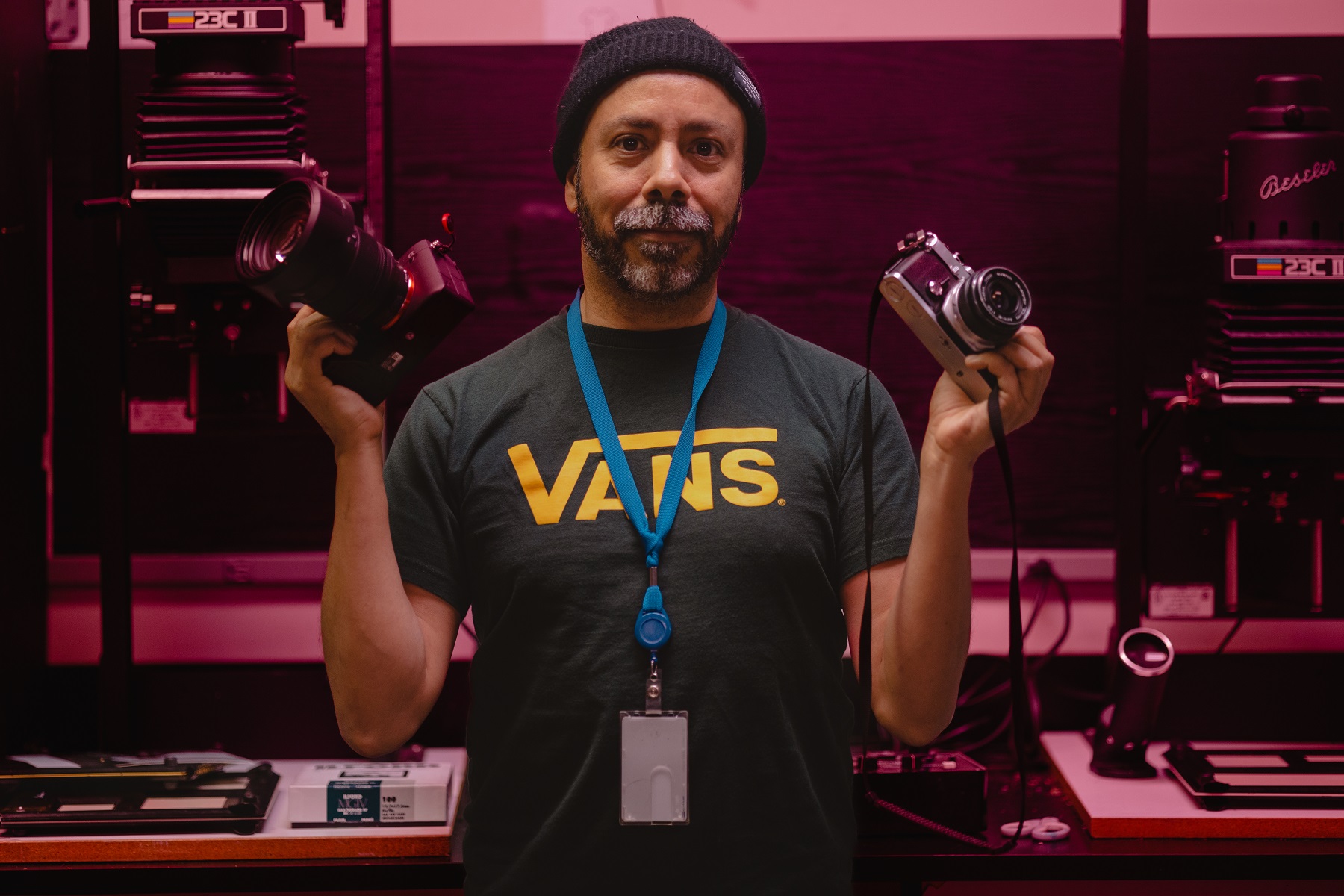ASC Emerging Creators Fellowship Will Help Héctor Vaca Cruz Amplify Immigrants' Voices

By Page Leggett
Héctor Vaca Cruz lives by a motto: “Open your mouth if you want to be heard.”
That may seem obvious to some. But if you’ve ever been part of an excluded or marginalized group, you probably understand what it means to be unheard.
Growing up in the rural South, Vaca Cruz felt out of place. “If I played with the white kids, the Black kids made fun of me,” he said. “If I played with the Black kids, the white kids made fun of me. There weren’t any kids who looked or talked like me, other than my sisters.”
Vaca Cruz is American; he was born in New York. His mother, Raquel, is American; she’s from Puerto Rico. But when the family moved from New York to Lexington, South Carolina, they were all presumed to be something else.
“I somehow went from being a U.S. citizen of Ecuadorian and Puerto Rican parents to [in people’s minds] undocumented,” he said. “Here in the South, we’re all assumed to be… here illegally.”
In addition to feeling isolated, he noticed how his father was made to feel insignificant. “He’d come home defeated every day because people would yell at him to ‘speak English,’” Vaca Cruz said. “My father felt voiceless.”
By the time of his father’s death in 2009, Vaca Cruz had been working as a community organizer for three years. It was a career he started after being fired from a job for “empowering co-workers by letting them know their labor rights.” Community organizing led him to meet people like his father and help them find their voices.
It’s been satisfying work. But he’s ready to unleash his inner artist.
“After 17 years of community organizing and four years developing my photography skills, I am ready to transition to documentary storytelling … full-time,” he wrote in his grant application.
He’s using his $10,000 ASC Emerging Creators Fellowship to establish himself as a documentary photographer and filmmaker. He’ll still work with immigrants and other historically excluded communities – and help tell their stories – but through a different lens. “My images give a voice to those who have felt stifled by society,” he wrote.
The first thing he did after receiving the fellowship was to build a new website: abrelabocaphoto.com – that’s Abre La Boca Photography. He’s looking for nonprofit clients who want to document their grassroots advocacy efforts. His tagline, “It takes a grassroots organizer to document grassroots work,” tells prospects that he has first-hand understanding of their work and goals.
Already, he’s had some interest. Two nonprofits – one in L.A. and one in Iowa – have invited him to share his work in upcoming exhibits.
One path leads to the next
His previous career has prepared Vaca Cruz for his next one. As an organizer, he honed his interviewing and storytelling skills and gained access to the underrepresented communities he wants to document.
Community organizing taught him the art of interviewing.
“I’ve learned to ask a lot of questions,” he said. “With organizing, when you conduct interviews, you should only speak 10% of the time and let the [other] person speak 90% of the time.”
He’s also learned you can never know a person’s story until you talk to them. “In the beginning, I would sometimes make assumptions about the challenges people have faced,” he said. “Now, I walk into a situation aware that I don’t know enough about that person to form an opinion.”
Vaca Cruz is one of the founding staff members of Action NC, a nonprofit with a mission of confronting and reducing the root causes of poverty and socioeconomic inequality through grassroots education, training and mobilization. He serves as its training and immigrant justice director.
Legendary community organizer Marshall Ganz, who worked with Cesar Chavez on farm worker unions, has inspired Cruz in more ways than one. Ganz is an organizer and a storyteller.
“He teaches a [storytelling] technique that includes the story of self, the story of us and the story of now,” Vaca Cruz said. “The story of self is telling your story in such an amazing way that people want to follow you. It’s a narrative that includes a challenge you faced, a revelation you had and how that led to a solution. The story of us shows how we’re connected; it’s the broader story of community. The story of now places that collection of stories into the context of the times.”
Vaca Cruz is incorporating that framework into his filmmaking.
Organizing has been more than a job for him. “Before I became a community organizer, I was going through a period of depression,” he said. “Community organizing saved my life. Helping others have a voice helped me deal with my own demons. And all that played into what eventually became my photography work.”
Twin arts: Photography and filmmaking
In 2018, Vaca Cruz picked up his first professional camera and started documenting his community. That ultimately led to a new career goal.
Just as community organizing was a solid foundation for street photography, street photography makes a solid foundation for documentary filmmaking.
But Vaca Cruz knew he needed to hone other skills, so he applied for the fellowship from ASC grant. “Adding filmmaking to my skillset will complement my photographic abilities and make for a more compelling argument to hire me,” he reasoned. He used part of his grant to enroll in The Art of Documentary filmmaking course.
Once he completes the course, he’ll spend July through next February filming, March through May 2024 editing and the final month of the fellowship promoting his film. He intends to host the first public viewing in late June 2024 at the OBRA Collective Gallery in the VAPA Center.
He’s already an expert in the theme of his film: Community organizers.
“Sadly, our society looks down on community organizers,” he said. “The dominant narrative is that community organizers are troublemakers … anti-capitalists and anarchists.”
He’ll dispel that notion by focusing on the personal stories of two or three community organizers and answering the questions: What drove them to this work? What’s their life story, and how does inform their work?
Making dreams possible
The fellowship from ASC made it possible for Vaca Cruz to build a website, enroll in a filmmaking class, upgrade two pieces of gear and purchase a desktop computer and a new camera lens. The fellowship also did something less tangible, but just as important.
“I knew what I wanted to do, but I didn’t feel it was possible,” he said. “The grant gave me the confidence to move forward. It was a kick in the butt.”
He’s not hoarding his new-found knowledge. He’s sharing it. “Understanding that not everyone has access to the [same] opportunities, I plan on paying it forward by hosting a community workshop on documentary photography,” he wrote. “The goal will be to inspire others to … pursue their creative dreams.”
He led Zoom workshops during the pandemic and plans to host more. What’s more, he plans to teach most of them in Spanish so that immigrants “can have the same opportunities as everybody else,” he said.
A father’s pride
Vaca Cruz’s father didn’t approve of his career: “My father would criticize me and say I should do better. He wanted me to become an engineer – something more mainstream and accepted.”
What Vaca Cruz didn’t know until after his father’s death was that his dad used to brag about the work his son was doing. “He pushed me because he wanted better for me,” Vaca Cruz said. “But he was telling people how proud he was of me for helping our community. That helps. I was very depressed when I thought I let my father down.”
If his father were alive today, Vaca Cruz suspects he’d react the same way to his career change: “I think he’d tell me I need to do better. But I also think I’d find out later that he was bragging about me for helping people like him. He always felt no one was listening.”
His father tried mightily to become a U.S. citizen, but he kept encountering roadblocks. “He died never achieving his dream,” Vaca Cruz said. “So, I think he’d appreciate that my work allows people to tell their stories. He wouldn’t have felt so alone if he’d known other people were going through the same thing. He might not have done what he did. My goal is to ensure no other family has to lose a loved one.”
Vaca Cruz is listening to people who feel unheard and speaking for those who feel suppressed. He’s using his art for a higher purpose – to give voice to the voiceless.
Follow Héctor Vaca Cruz on Instagram at @abrelobacaphoto (for documentary photography) and @hectorvacacruz (for all his photography, including dogs, musicians in concert and more).

